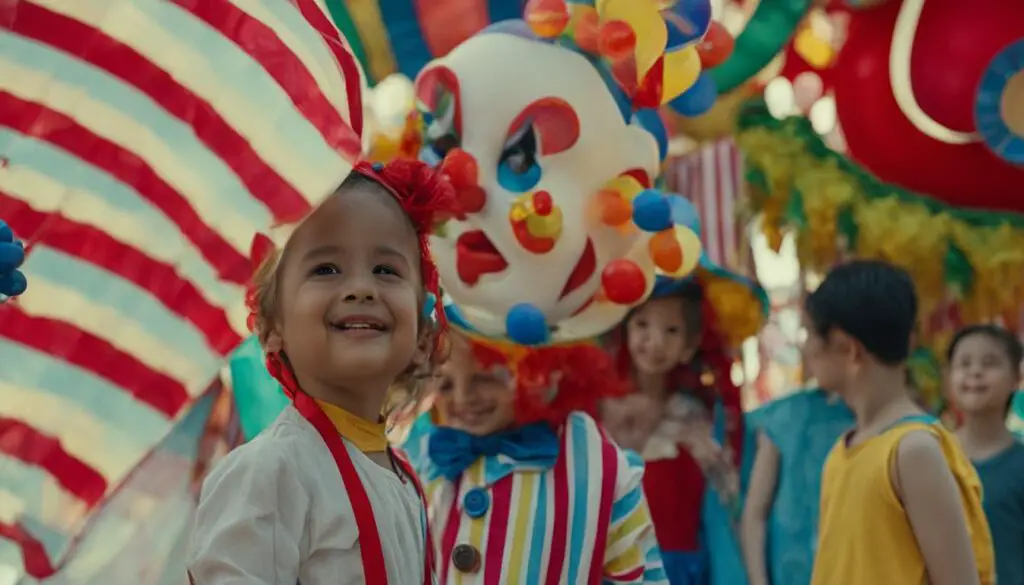Clowns have long been a source of fear for many people, especially children. This fear, known as coulrophobia, can have a significant impact on a child’s well-being.
The fear of clowns can stem from several factors, including the inability to read genuine emotion on a clown’s face and their unpredictable and manic behavior. According to clinical psychologist Jerry Bubrick, fear of clowns often starts at a young age and is more common in children with anxiety. Additionally, the uncanny appearance of clowns, resembling humans but not quite, can contribute to discomfort and fear. The prevalence of evil clowns in popular culture, such as Pennywise from Stephen King’s novel It, has also played a role in perpetuating this fear.
It is important for parents to understand their child’s fear and provide reassurance and support.
Key Takeaways:
- Kids’ fear of clowns, known as coulrophobia, can have a significant impact on their well-being.
- Fear of clowns can be caused by the inability to read genuine emotion on a clown’s face and their unpredictable behavior.
- Children with anxiety may be more prone to fear clowns.
- The appearance of clowns, resembling humans but not quite, can contribute to discomfort and fear.
- Popular culture, such as movies and books featuring evil clowns, can perpetuate children’s fear of clowns.
Psychological Reasons for Kids’ Fear of Clowns
Psychologists believe that several psychological factors contribute to children’s fear of clowns. One significant factor is the inability to read genuine emotions on a clown’s face, which can be unsettling for children who rely on facial expressions to understand others’ feelings. The unpredictable and manic behavior of clowns can also generate fear and apprehension.
A child’s first encounter with a clown, such as at a birthday party, can be overwhelming and create a strong reaction, especially for those who are predisposed to anxiety. Additionally, the “uncanny valley” hypothesis suggests that clowns, with their almost but not quite human appearance, can make adults uncomfortable as well.
It is essential for parents to be aware of these psychological reasons and provide appropriate support to help their children overcome their fear of clowns.
Psychological Factors Contributing to Children’s Fear of Clowns
The psychological reasons behind children’s fear of clowns can vary from individual to individual, but there are some common factors that play a significant role:
- Inability to read emotions: Children rely on facial expressions to understand others’ feelings. When a clown’s face is heavily painted and exaggerated, it becomes challenging for children to interpret genuine emotions, which can create a sense of unease.
- Unpredictability: Clowns are known for their unpredictable and sometimes erratic behavior. This unpredictability can be intimidating for children, who prefer stability and predictability in their environment.
- First impressions: A child’s first encounter with a clown can be overwhelming, especially if it happens at a young age or in an unfamiliar setting. This initial experience can shape their perception and fear of clowns in the long run.
- Uncanny appearance: Clowns often have exaggerated features, unusual costumes, and colorful makeup, which can create a sense of unease. The “uncanny valley” hypothesis suggests that when something closely resembles but doesn’t quite replicate human features, it can elicit discomfort and fear.
Impact of Media on Children’s Fear of Clowns
The media has a profound influence on shaping children’s perception and fear of clowns. The prevalence of evil clowns in movies and books, such as Pennywise from Stephen King’s novel It, contributes to the fear and anxiety surrounding clowns. These portrayals often depict clowns as menacing and malevolent figures, further intensifying children’s fear.
Furthermore, media coverage of the “Creepy Clown” epidemic has created a behavioral contagion effect. Children are exposed to stories of creepy clown sightings and copycat behavior inspired by these media reports. This heightened exposure increases the fear and irrationality associated with clowns in the minds of children.
As parents, it is crucial to address children’s concerns and provide accurate information about clowns. Emphasize that most of the chatter about evil clowns is merely fictional or exaggerated. By being a reliable source of news and reassuring children of their safety, parents can help reduce clown phobia in children.
The Role of Media in Children’s Fear of Clowns
“The media’s portrayal of clowns as menacing figures can have a lasting impact on children’s fear and anxiety. It is important for parents to be mindful of the media content their children consume and provide appropriate guidance to help them navigate these depictions.” – Dr. Emily Johnson, Child Psychologist
One approach to reducing the impact of media on children’s fear of clowns is through media literacy. Teaching children to critically analyze and question the portrayal of clowns in movies, TV shows, and books can help them develop a more balanced understanding. Encouraging open discussions about clowns and separating fiction from reality will empower children to make informed decisions about their fears.
Moreover, introducing positive and friendly clown characters through media can help counteract negative stereotypes and alleviate fears. Media producers and content creators should strive to portray clowns in a more empathetic and approachable light, promoting a healthier perception of clowns among children.

| Impact of Media on Children’s Fear of Clowns | Ways to Reduce Clown Phobia in Children |
|---|---|
|
|
Overcoming Fear of Clowns in Kids
For children struggling with a fear of clowns, understanding and support from parents are crucial in helping them overcome their anxieties. As a parent, you can play a significant role in guiding your child through this challenge and providing them with the reassurance they need.
First and foremost, it’s important to be the primary source of information for your child. Convey the facts about clowns in a calm and authoritative manner, addressing any misconceptions they may have. Encourage open communication by listening to their concerns and answering their questions honestly, avoiding anything that may fuel frightening fantasies.
Realistic reassurance is key in helping your child understand that clowns are not real and not dangerous. Emphasize that the exaggerated makeup and costumes are simply part of an act and not something to be feared. By offering this reassurance, you can gradually help your child overcome their fear and let go of any negative associations they may have.
In addition to verbal reassurance, spending quality time with your child and maintaining familiar routines can provide comfort and a sense of security. Engage in activities that your child enjoys and create a positive environment where they feel safe. By addressing their fears head-on and providing unwavering support, you can help your child conquer their fear of clowns and foster their emotional well-being.
FAQ
Why are kids scared of clowns?
Kids can be scared of clowns due to several reasons. They may find it unsettling to read genuine emotions on a clown’s face, which can be confusing and uncomfortable. The unpredictable and manic behavior of clowns can also generate fear and apprehension. Additionally, the “uncanny valley” hypothesis suggests that clowns, with their almost but not quite human appearance, can make children uncomfortable.
What are the psychological reasons for kids’ fear of clowns?
The psychological reasons for kids’ fear of clowns include the inability to read genuine emotions on a clown’s face and the unpredictable and manic behavior of clowns. Children who rely on facial expressions to understand others’ feelings may find it difficult and unsettling when they cannot read a clown’s emotions. Additionally, a child’s first encounter with a clown can be overwhelming, especially for those who are predisposed to anxiety.
How does the media impact children’s fear of clowns?
The media plays a significant role in shaping children’s perception and fear of clowns. The prevalence of evil clowns in movies and books, as well as media coverage of the “Creepy Clown” epidemic, can contribute to fear and anxiety surrounding clowns. By addressing their children’s concerns and providing accurate information about clowns, parents can help reduce clown phobia in children and mitigate the negative impact of the media.
How can kids overcome their fear of clowns?
To help children overcome their fear of clowns, parents should be their primary source of information, convey the facts in a calm and authoritative manner, and set the emotional tone. It is essential to take cues from children, listen to their concerns, and answer their questions without encouraging frightening fantasies. Providing realistic reassurance that clowns are not real and not dangerous is important. Additionally, spending time with the child and maintaining familiar routines can provide comfort and reassurance.
